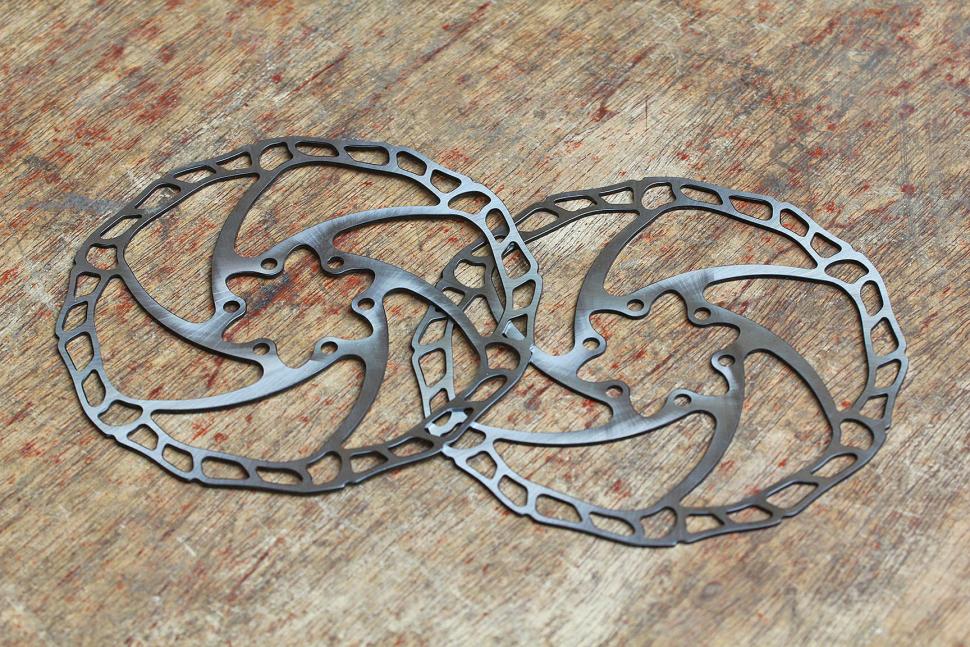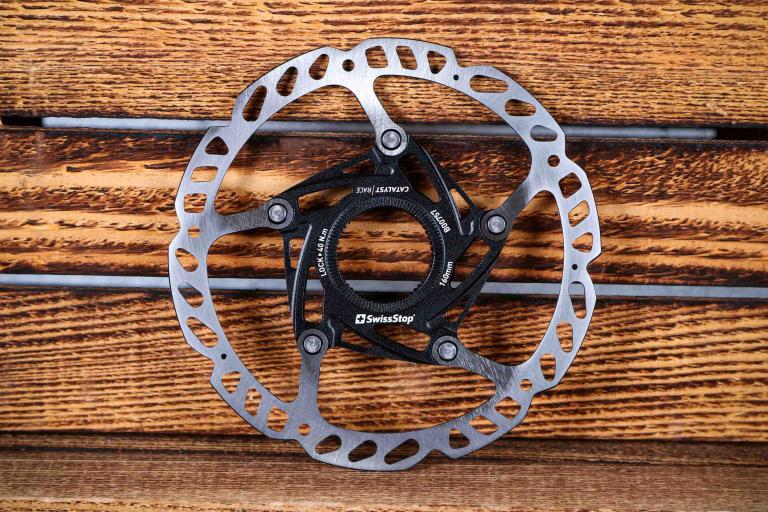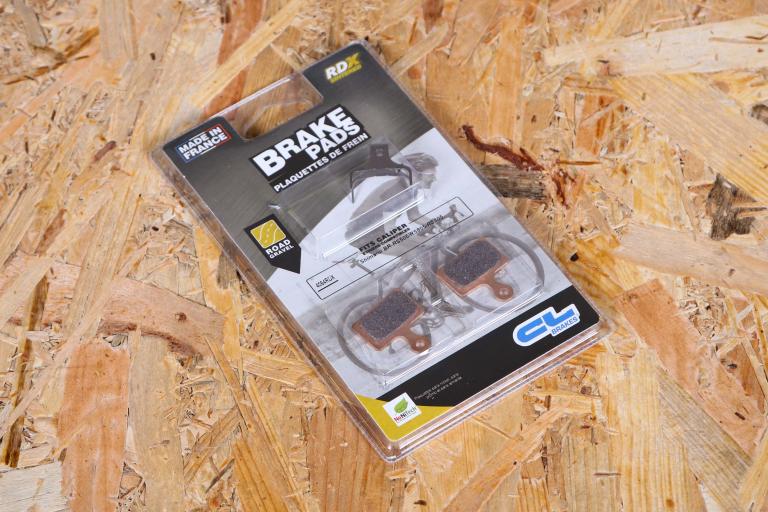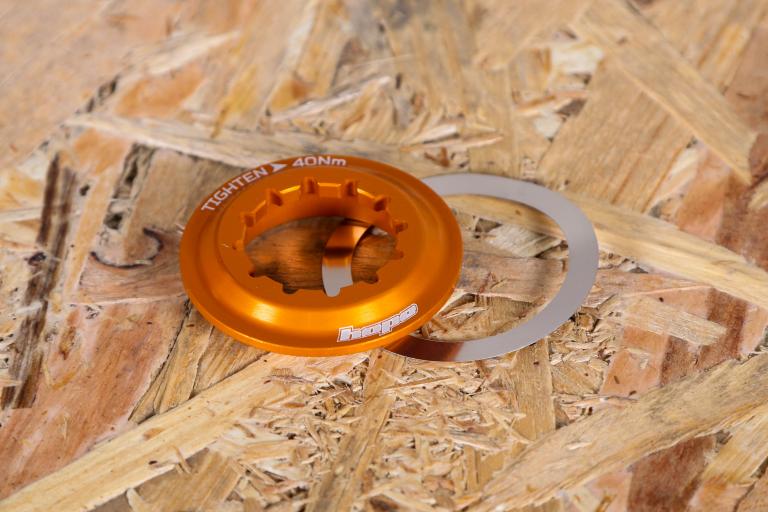- News
- Reviews
- Bikes
- Accessories
- Accessories - misc
- Computer mounts
- Bags
- Bar ends
- Bike bags & cases
- Bottle cages
- Bottles
- Cameras
- Car racks
- Child seats
- Computers
- Glasses
- GPS units
- Helmets
- Lights - front
- Lights - rear
- Lights - sets
- Locks
- Mirrors
- Mudguards
- Racks
- Pumps & CO2 inflators
- Puncture kits
- Reflectives
- Smart watches
- Stands and racks
- Trailers
- Clothing
- Components
- Bar tape & grips
- Bottom brackets
- Brake & gear cables
- Brake & STI levers
- Brake pads & spares
- Brakes
- Cassettes & freewheels
- Chains
- Chainsets & chainrings
- Derailleurs - front
- Derailleurs - rear
- Forks
- Gear levers & shifters
- Groupsets
- Handlebars & extensions
- Headsets
- Hubs
- Inner tubes
- Pedals
- Quick releases & skewers
- Saddles
- Seatposts
- Stems
- Wheels
- Tyres
- Health, fitness and nutrition
- Tools and workshop
- Miscellaneous
- Buyers Guides
- Features
- Forum
- Recommends
- Podcast
review
 DiscoBrakes Super Light Race Disc Rotor
DiscoBrakes Super Light Race Disc Rotor£16.49
VERDICT:
Well-made lightweight disc rotors for the weight-conscious
Weight:
164g
Contact:
At road.cc every product is thoroughly tested for as long as it takes to get a proper insight into how well it works. Our reviewers are experienced cyclists that we trust to be objective. While we strive to ensure that opinions expressed are backed up by facts, reviews are by their nature an informed opinion, not a definitive verdict. We don't intentionally try to break anything (except locks) but we do try to look for weak points in any design. The overall score is not just an average of the other scores: it reflects both a product's function and value – with value determined by how a product compares with items of similar spec, quality, and price.
What the road.cc scores meanGood scores are more common than bad, because fortunately good products are more common than bad.
- Exceptional
- Excellent
- Very Good
- Good
- Quite good
- Average
- Not so good
- Poor
- Bad
- Appalling
Discobrakes' Super Light Race Disc rotors are an affordable way to save around 25% from the weight of typical standard-fit rotors. Through the removal of as much superfluous steel as possible, these 160mm rotors weigh a featherlike 82g each. The Shimano RT66 rotors which they replaced on my bike weigh 113g each.
If you're a fan of lightweight bikes then you might have reservations about joining the Disc-Brake Revolution™. At present disc-braked road bikes are invariably heavier than their rim-braked equivalents. By the time the UCI allows disc-braked bikes in the peloton, you can be sure that they'll be right at the 6.8kg weight limit, but this will inevitably be achieved via the use of high-end components throughout. Of course, the UCI might also have revisited its 6.8kg weight limit by then, but that's another story.
Discobrakes is a Singaporean company (with a UK distribution hub) selling brake pads, rotors, bolts and the like online, and these are their lightest rotors, offering a way to deal with some of that disc brake weight penalty.
For fans of nth-degree colour-coordination, Discobrakes also sells some pretty lurid [read: hideous) brake rotors with painted spokes, as well as some heavier-weight offerings aimed at the gravity market. These Super Light rotors are only available in 160mm diameter, so if you heed Shimano's advice that 140mm is where it's at for road disc, then they're not for you. They're also only available in the IS 6-bolt mounting standard.
Like most disc brake rotors, these are ground to make them as flat as possible; Discobrakes says they're consistent to a tolerance of 0.08mm. That ground surface sounds initially a bit grainy under braking, but after a while it polishes off. Once they were bedded-in, I was hard-pressed to notice any real difference in feel or performance to the Shimano rotors I'd been using before. Overall standards of machining are good, with no burrs or other obvious flaws.
At £16.49 each (supposedly discounted from £25), these rotors cost about the same as RT66 rotors they replaced. They look quite a lot like Airotors from lightweight braking component manufacturer Ashima, but they're not identical. Ashima claimed a weight of 85g per rotor for the 160mm Airotor, which at the time of launch it said was the lightest rotor on the market. The Airotors are priced at £25, which makes these rotors seem like decent value. Another alternative is the Razor from KCNC, which claims to be a few grams lighter and is priced a bit higher. If weight isn't that important, or you just don't think that brakes is the place to go looking for gram savings, there are myriad other options out there.
In short, then, you're getting a significant percentage weight-saving over most standard disc brake rotors without costing a great deal more. If you believe the theory behind those Shimano cooling fins and aluminium sandwich-construction rotors, these solid-steel rotors are perhaps not as well-suited for fast mountain descents, but I had no issues with using them on and off-road around my neck of the woods. A fairly inexpensive upgrade if you're chasing grams, then, and a smart choice if you're building a lightweight disc-braked bike, unless you're going for Centrelock hubs, that is.
Verdict
Well made lightweight disc rotors for the weight-conscious
If you're thinking of buying this product using a cashback deal why not use the road.cc Top Cashback page and get some top cashback while helping to support your favourite independent cycling website
road.cc test report
Make and model: DiscoBrakes Super Light Race Disc Rotor
Size tested: 160 mm , Silver
Tell us what the product is for, and who it's aimed at. What do the manufacturers say about it? How does that compare to your own feelings about it?
Super Light Race Disc Rotor
International Standard 6 bolt
Manufactured to a tolerance of within 0.08mm
Rate the product for quality of construction:
8/10
Rate the product for performance:
8/10
No issues on the hills around our way. If you're riding big hills then you might feel more comfortable with something more substantial.
Rate the product for durability:
7/10
I would expect this to wear faster than rotors with less material removed, but it's doing fine after a few hundred kilometres with no discernible thinning.
Rate the product for weight, if applicable:
10/10
Rate the product for value:
8/10
Tell us how the product performed overall when used for its designed purpose
Just fine.
Tell us what you particularly liked about the product
Looks and low weight would be the main draws I guess.
Tell us what you particularly disliked about the product
Would be good if it was available in Centrelock.
Did you enjoy using the product? Yes.
Would you consider buying the product? Probably not - I'm not that weight-focused to be honest.
Would you recommend the product to a friend? Yes, if they were weight-focused.
About the tester
Age: 36 Height: 190cm Weight: 78kg
I usually ride: Boardman CX team for the daily commute My best bike is: Rose Xeon CRS
I've been riding for: Over 20 years I ride: Most days I would class myself as: Expert
I regularly do the following types of riding: road racing, time trialling, cyclo cross, commuting, touring, club rides, sportives, general fitness riding, fixed/singlespeed, mtb,
Jez spends his days making robots that drive cars but is happiest when on two wheels. His roots are in mountain biking but he spends more time nowadays on the road, occasionally racing but more often just riding.
Latest Comments
- chrisonabike 1 sec ago
Are you sure it was electric- that sounds more like an energon monster?
- OldRidgeback 14 min 18 sec ago
Interesting, tho they only take narrow 20" slick tyres. I'd want to be able to use 1.75 Maxxis DTHs.
- don simon fbpe 42 min 18 sec ago
Who'd've thought that a certain whinging section (right whingers get uppity for calling them what they are) of society would resort to division,...
- Exup 2 hours 14 min ago
At least some justice is being done........
- BIRMINGHAMisaDUMP 2 hours 24 min ago
I imagine the Police treat bike theft as an insurance issue rather than a criminal issue. Can't blame them to be honest. The best thing is to use...
- David9694 2 hours 51 min ago
Police launch investigation into destruction of barber shop in Hythe High Street...
- ktache 11 hours 21 min ago
I'd love for them to put a number on that "inappropriate speed"
- Nick T 12 hours 14 min ago
They need to use some harder material for the cleat retention clip really, that's worn out long before any bearing has had a chance to fail on...
- yiipeeia 15 hours 4 min ago
I am 67 and I cycle with two groups during the year The Haddenham Easyriders International who ride during the summer on Thursday evenings, and The...




Add new comment
4 comments
If a riders drags their brakes down an alpine descent any hydraulic disc brake would overheat and fail. Much more so if they choose 140mm over 160's like these. The pad compound (eg whether metallic or not) will have more affect on the transfer of heat to the brake fluid (as its right next to the cylinder). Choose a soft or ceramic compound for long descents, but don't expect the brake pad to last long.
Yes there's a reason brake manufacturers don't make them lighter - its an arbitrary cut off to please the mass market and most people. This leaves it open to fine tuning and optimisation if the rider knows what they are doing.
http://www.hopetech.com/product/disc-rotors/ Have been pretty flawless... the anodised colours are a mater of personal taste (I like them).
Bug guy I am, ice tech rotors for me
Wouldn't advise anyone to use these if they are likely to do any long descents, especially where there will be repeated deceleration from a decent speed (eg hairpins). They will necessarily heat up more than normal rotors for the same braking power due to smaller heat capacity. This could lead to pad degradation or boiling brake fluid causing brake failure. The heavier you are, the bigger the problem.
There is a reason brake manufacturers don't make them lighter.
If you only ride the Fens, go for it!